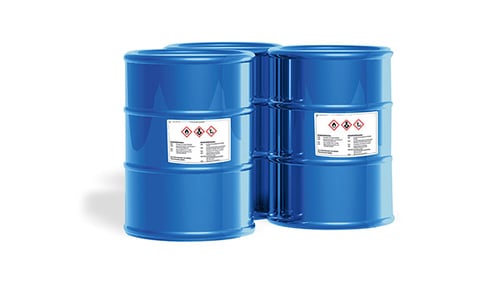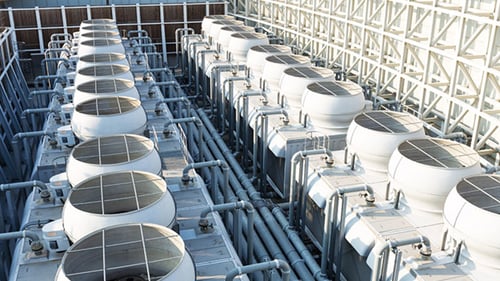In this modern world, water treatment is a vital component in various industries. One of the key elements in this process is the use of cooling tower chemicals. This article will review five important facts about 'Cooling Tower Chemical for Water Treatment', which will not only enhance your understanding of this topic, but also help in choosing the right solution for your water treatment needs. By understanding the important role of this chemistry, you can improve the efficiency and sustainability of water treatment systems in your industry.
Cooling towers are critical components tasked with removing excess heat from industrial processes through water evaporation. However, without proper chemical treatment, these systems can quickly become a hotbed for microorganism growth, scale formation, and corrosion, ultimately reducing operational efficiency and increasing maintenance costs. Using the appropriate chemistry not only maintains the condition of the water in the system but also protects the equipment from damage, extends its service life, and ensures smooth and efficient operation.
At Beta Pramesti Asia, we offer a wide range of chemical treatment options.
At Beta Pramesti Asia, we understand the importance of maintaining chemical balance in cooling towers. Our products, such as BETAGARD, are designed to meet this challenge, offering a comprehensive solution that protects your system from a variety of issues. In this article, we will dive deeper into the different types of cooling tower chemicals, the importance of choosing the right chemistry, and how our products can help you in maintaining the efficiency of your water treatment system.

Importance of Cooling Tower Chemical in Water Treatment
Cooling tower chemicals are not just an addition to the water treatment process, but an essential part that determines the effectiveness and sustainability of the system. Using the right chemistry in a cooling tower not only optimizes operations but also provides significant long-term benefits. Here are some of the reasons why this chemistry is so important:
- Corrosion Control: Cooling tower chemicals help prevent corrosion of the equipment, which is vital to maintaining the integrity and longevity of the system. Corrosion can cause serious damage to critical components such as pipes, heat exchangers and tanks. By ensuring that your system is protected from corrosion, you not only maintain operational reliability but also avoid costly repair costs.
- Prevention of Scale Formation:Reduces the risk of scale formation that can impede water flow and heat exchanger efficiency. Scale formation of minerals such as calcium and magnesium can result in decreased performance and increased energy consumption. Scale prevention is an important step in maintaining the thermal efficiency of your system.
- Biological Growth Control: It is important to control the growth of microorganisms that can cause system damage and health issues. Effective biological control protects not only the system but also the health of employees and the surrounding environment. It prevents the formation of biofilms that can lead to decreased efficiency and health risks.
- Chemical Stability and Water Quality: Maintaining water quality in cooling towers is key to efficient operation. Cooling tower chemicals help maintain pH balance and control mineral content, which is important to prevent issues such as corrosion and scale formation.
- Energy Efficiency and Cost Savings: By keeping the system working at optimal conditions, the proper use of cooling tower chemicals can result in significant energy savings. This translates to lower operational costs and reduced environmental impact.
- Cooling tower chemical usage can result in significant energy savings.
The right chemical choice not only affects system performance but also operational costs and environmental protection. By using products such as BETAGARD from Beta Pramesti Asia, you ensure that your water treatment system is operating at maximum efficiency. BETAGARD is designed to address these challenges, providing comprehensive and effective protection against the various issues often encountered in cooling towers, with a focus on efficiency, sustainability and long-term reliability.
Types of Cooling Tower Chemical and Their Uses
Understanding the different types of cooling tower chemicals and their functions is an important step in choosing the right product. Here are some of the main types of chemicals used in cooling towers, each with a specific role to play in ensuring system efficiency and sustainability:
- Corrosion Inhibitors: These chemicals are essential for protecting the metal components of the cooling tower system against corrosion. Corrosion inhibitors work by forming a protective film on metal surfaces, reducing oxidation reactions and extending equipment life.
- Scaling Inhibitors: The use of scaling inhibitors is essential to prevent the accumulation of minerals that can clog the system and reduce heat transfer efficiency. These inhibitors work by interfering with the process of mineral crystal formation, thereby preventing scale formation.
- Biocarbons.
- Biocides:This type of chemistry is used to control the growth of microorganisms within the cooling tower system. Biocides play an important role in preventing the development of bacteria, fungi, and algae that can cause damage to equipment and health problems.
- Dispersants: Dispersants help prevent the settling of solid particles within the system. By keeping these particles in a dispersed state, dispersants ensure that the system remains clean and efficient.
- Dispersants: Dispersants help prevent the settling of solid particles within the system.
- PH adjustment: The chemicals used to adjust the pH level of the water in the system are also important. Proper pH levels are important to control corrosion, scale formation, and biological activity.
- Anti-Freeze: In colder climates, anti-freeze may be required to prevent water in the system from freezing, which can cause serious damage.
- Surfactants: Surfactants are often used to help improve water contact with surfaces in the system, which increases heat transfer efficiency.

How Cooling Tower Chemical Improves Efficiency and Sustainability
Cooling tower chemicals play an important role in improving the efficiency and sustainability of water treatment systems. Proper use of chemistry in cooling towers not only ensures more efficient operations but also contributes to reduced environmental impact. Here are some specific ways in which these chemistries improve efficiency and sustainability:
- Improved Heat Transfer:By preventing scale formation and corrosion, cooling tower chemicals help keep heat exchanger surfaces clean. Clean surfaces ensure more effective heat transfer, improving operational efficiency and reducing energy consumption.
- Equipment Life Extension: Corrosion and scale accumulation are two major factors that reduce equipment life. By controlling both of these factors, cooling tower chemistry extends equipment life, reducing the need for replacement and regular maintenance, which translates to long-term cost savings.
- Reduction of Equipment Life.
- Reduced Water Use: Effective chemistry allows for longer water cycles in the system, reducing the need for new water replenishment. This not only saves water but also reduces water treatment costs.
- Reduced Carbon Emissions:Higher energy efficiency means lower fuel usage for heating or cooling, which directly reduces the carbon footprint of operations. This assists companies in achieving their sustainability goals.
- Effective Biological Control: Effective control of microorganisms with biocides reduces the risk of contamination and health issues, which is important not only for system sustainability but also for environmental sustainability.
- Use of Environmentally Friendly Chemicals: Many modern cooling tower chemical products are designed with environmental impact in mind. The use of safer and more environmentally friendly chemicals reduces the potential negative impact on the surrounding ecosystem.
Choosing the Right Cooling Tower Chemical: A Practical Guide
Choosing the right cooling tower chemical requires understanding the specific needs of your system. This selection process depends not only on the characteristics of the cooling tower itself but also on various operational and environmental factors. Here are some important steps and considerations in choosing a cooling tower chemical:
- Evaluate System Characteristics: Consider the type of cooling tower, its construction materials, and operational capacity. Each system has unique chemical needs depending on these factors.
- Water Quality Analysis: Input water and water conditions in the system greatly affect the type of chemistry required. Regular water quality tests will help determine chemical needs such as pH regulation, scale control, and corrosion inhibitors.
- Water Quality Analysis: Input water and water conditions in the system greatly affect the type of chemistry needed.
- Environmental and Sustainability Considerations: Choose products that are not only effective but also environmentally friendly. Chemicals that reduce water and energy consumption and produce less waste are more sustainable choices.
- Select products that are not only effective but also environmentally friendly.
- Consult an Expert: Consult with chemists and engineers who are experienced in cooling tower water treatment. They can provide recommendations based on a thorough analysis of your system and operational conditions.
- Consider Maintenance Needs: Choose chemistries that ease the process of maintaining and cleaning the system. Products that minimize downtime and make cleaning easier will reduce long-term operational costs.
- Consider Maintenance Needs:
- Monitor and Evaluate Performance: After selecting and applying a specific chemistry, it is important to routinely monitor and evaluate system performance. This helps in adjusting the chemical dosage and making changes if required.
- Compliance with Regulations: Ensure that the selected chemistry meets all applicable regulations and safety standards. This is not only important for operational safety but also to comply with environmental laws and regulations.
Case Study: Implementation of Cooling Tower Chemical in Industry
As a practical example, we can look at the implementation of cooling tower chemicals in a large manufacturing industry in Indonesia. This case study illustrates how the right chemical implementation can bring significant changes in operational efficiency and sustainability.
Industry Background: This industry is one of the key players in the manufacturing sector with an intensive need for water treatment to maintain their production processes. They operate large-scale cooling towers that play a crucial role in maintaining the temperature of machinery and equipment.
Challenges: Prior to implementation, they faced several key issues, including rapid scale formation, equipment corrosion, and high maintenance costs. This resulted in unplanned downtime and increased operational costs.
Solution: Beta Pramesti Asia stepped in by introducing BETAGARD Cooling Tower Chemical Series, a range of cooling tower chemical products. Our cooling tower chemicals are designed to address the specific issues faced by the industry, with a focus on corrosion prevention, scale formation control, and biological control.
Implementation: Implementation included a thorough analysis of the existing cooling tower system, customized with the right BETAGARD Cooling Tower Chemical Series chemical formulation. The Beta Pramesti Asia team also provided training to industry staff on the effective use and monitoring of the chemistry.
Results: After a few months of application of BETAGARD Cooling Tower Chemical Series, the results were very significant. There was a drastic reduction in scale formation and corrosion, which directly improved heat transfer efficiency and reduced maintenance costs. In addition, with better biological control, health and safety risks were also reduced.
Long Term Impact: The implementation of BETAGARD Cooling Tower Chemical Series has helped the industry not only in saving operational costs but also in improving its operational sustainability. They now experience less downtime, better energy efficiency, and have less environmental impact.
Conclusion and Next Steps
Through this article, we have learned various important aspects of 'Cooling Tower Chemicals for Water Treatment'. Knowledge of the types of chemicals used, the importance of choosing the right products, and how they improve operational efficiency and sustainability is key information for any industry that relies on water treatment systems.
Di Beta Pramesti Asia, Inc.
At Beta Pramesti Asia, we are committed to providing solutions that not only meet but exceed your expectations. We understand that every cooling tower system has unique needs, and therefore, our approach is always customized to meet your specific requirements. Contact us for your cooling tower chemicals needs.
